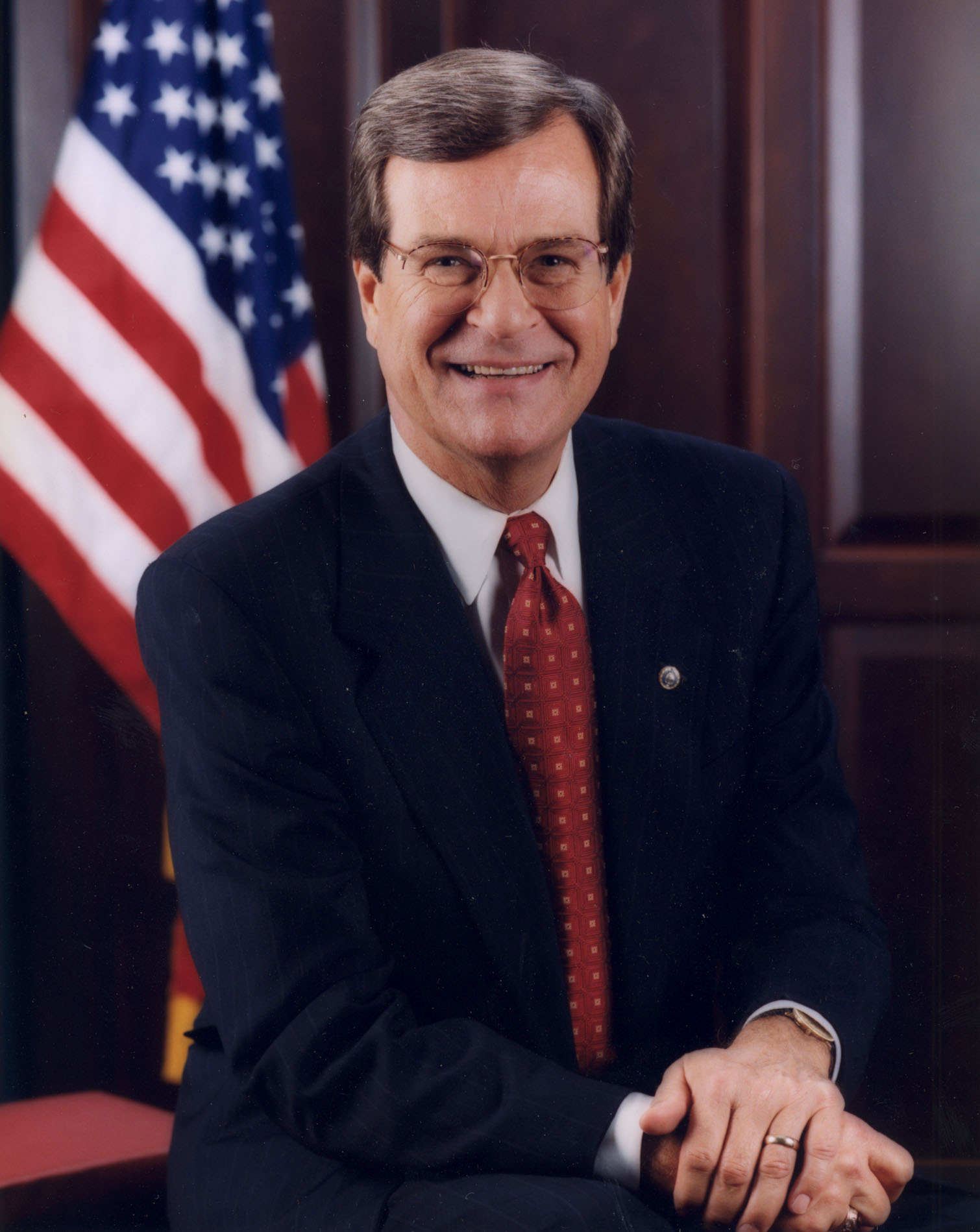
Trent Lott
Chester Trent Lott Sr. (born October 9, 1941) is an American lawyer, author, and politician who represented Mississippi in the United States House of Representatives from 1973 to 1989 and in the United States Senate from 1989 to 2007. Lott served in numerous leadership positions in both chambers of Congress as one of the first of a wave of Republicans winning seats in Southern states that had been solidly Democratic. Later in his career, he served twice as Senate Majority Leader, and also, alternately, Senate Minority Leader. In 2003, he stepped down from the position after controversy due to his praising of Senator Strom Thurmond's 1948 segregationist Dixiecrat presidential bid.
"Senator Lott" redirects here. For other uses, see Senator Lott (disambiguation).
Trent Lott
Don Nickles
Tom Daschle
Tom Daschle
Tom Daschle
Tom Daschle
Don Nickles
Tom Daschle
Tom Daschle
Don Nickles
Bob Dole
Bob Dole
Don Nickles
Robert H. Michel
Republican (1972–present)
Democratic (before 1972)
2
University of Mississippi (BPA, JD)
From 1968 to 1972, Lott was an administrative assistant to Representative William M. Colmer of Mississippi, who was also the chairman of the House Rules Committee. Upon Colmer's retirement, Lott won Colmer's former seat in the House of Representatives. In 1988, Lott ran successfully for the U.S. Senate to replace another retiree, John C. Stennis. After Republicans took the majority in the Senate, Lott became Senate Majority Whip in 1995 and then Senate Majority Leader in 1996, upon the resignation of presidential nominee Bob Dole of Kansas. Following GOP losses in the 2000 Senate races that resulted in a 50–50 split, Lott briefly became Senate Minority Leader, as Democrat Al Gore was still Vice President and President of the Senate[a] at the beginning of the new term on January 3, 2001. Seventeen days later, Lott was restored as Senate Majority Leader after Republicans regained control of the chamber upon the inauguration of the new vice president, Dick Cheney, on January 20. Lott was Senate Majority Leader until June 6, 2001, when Vermont Senator Jim Jeffords changed his party affiliation from Republican to Independent, and caucused with the Senate Democrats for the remainder of his term. Thereafter, Lott again served as Senate Minority Leader.
Following Republican gains in the 2002 midterm elections, Lott was slated to again become Majority Leader when the next Senate session began in January 2003. However, on 20 December 2002, after significant controversy following comments he made regarding Strom Thurmond's presidential candidacy, Lott resigned as Senate Minority Leader.
Though no longer in leadership, Lott remained in the Senate until resigning in 2007. Fellow Republican Roger Wicker won the 2008 special election to replace him. Lott became a lobbyist, co-founding the Breaux–Lott Leadership Group. The firm was later acquired by law and lobbying firm Patton Boggs. Lott serves as a Senior Fellow at the Bipartisan Policy Center (BPC), where he focuses on issues related to energy, national security, transportation and congressional reforms. Lott is also a co-chair of BPC's Energy Project. In June 2020 Lott was fired from the Washington law and lobbying firm Squire Patton Boggs while negotiating to join another firm.[1] Days later on June 15, 2020, Lott joined Crossroads Strategies along with his longtime colleague John Breaux.[2]
Early life[edit]
Lott was born in Grenada, Mississippi, and lived his early years in nearby Duck Hill, where his father, Chester Paul Lott, sharecropped a stretch of cotton field. Lott's mother, the former Iona Watson, was a schoolteacher. Lott's father was a philanderer with a drinking problem, and Lott frequently acted as a mediator when his mother threatened his father with divorce.[3] When Lott was in the sixth grade, the family moved to Pascagoula, where Lott's father worked at a shipyard.[4]
Lott attended college at the University of Mississippi in Oxford, where he obtained an undergraduate degree in public administration in 1963 and a Juris doctor degree in 1967. He served as a field representative for Ole Miss and was president of his fraternity, Sigma Nu. Lott was also an Ole Miss cheerleader, on the same team with future U.S. Senator Thad Cochran.[5] At the time that Lott was president, the Sigma Nu fraternity house was raided by the troops from the 716th Battalion during the "Battle of Oxford". They discovered a sizeable weapon cache.[6]
Regarding his education, the Congressional Record from 1999 quotes Senator Lott declaring: "I am a product of public education from the first grade through the second, third, and fourth grades where I went to school at Duck Hill, Mississippi, and I had better teachers in the second, third, and fourth grades in Duck Hill, Mississippi, than I had the rest of my life."[7]
While an undergraduate at the University of Mississippi, Lott participated in the effort at the 1964 national convention of the Sigma Nu fraternity to oppose a civil rights amendment proposed by the Dartmouth College and Duke University chapters to end mandatory racial exclusion by the fraternity. Lott sided with the segregationists who defeated the amendment. The Dartmouth chapter subsequently seceded from the fraternity, and Sigma Nu remained whites-only until later in the decade.[8][9]
Personal life[edit]
Lott married Patricia Thompson on December 27, 1964. The couple has two children: Chester Trent "Chet" Lott Jr., and Tyler Lott.
Lott is a Freemason, and holds the Grand Cross in the Southern Jurisdiction of the United States in the Ancient and Accepted Scottish Rite.[51]
Legacy[edit]
Trent Lott Academy in the Pascagoula School District is named after him.[52][53] Lott is also the namesake of Trent Lott International Airport in Moss Point, Mississippi.[54] The character of Lott Dod from the film Star Wars: Episode I – The Phantom Menace is named after him.[55]
The Trent Lott Leadership Institute is named after him, located at his alma mater, the University of Mississippi.[56]
Lott has been quoted as being opposed to homosexuality, comparing it to other issues such as alcoholism.[57]